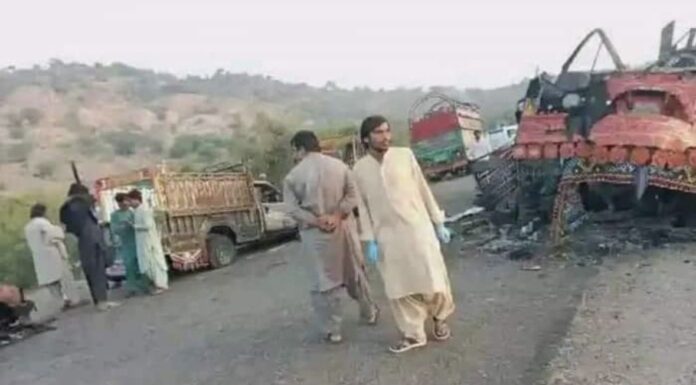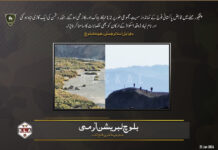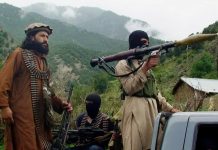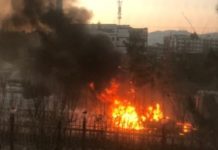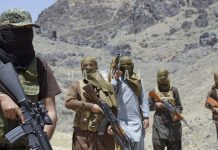Quetta: Baloch Liberation Army (BLA) tonight announced that its ‘Operation Herof’ has been “completed successfully” after 20 hours, during which its fighters killed 130 Pakistani soldiers and injured many others in attacks at multiple places across Balochistan.
“The Baloch Liberation Army announces the successful completion of its fidayee operation “Herof,” which began on August 25th,” its spokesman Jeeyand Baloch said in a statement.
Significantly, the operation was carried out on the 18th death anniversary of Balochistan’s tallest freedom fighter Akbar Bugti, who was killed in aerial bombing by Pakistani military on this day in 2005 on specific directions of the then military ruler of Pakistan Gen Pervez Musharraf.
As part of the Operation Herof, the fidayeen of Majeed Brigade, a BLA unit specialising in suicide attacks, took control of Army camp in Bela area, while two other units — the STOS and Fatah Squad — set up checkpoints on central highways across Balochistan, bringing them under their control, he said.
“During the operation, the Majeed Brigade of BLA successfully maintained control of the Bela camp for 20 hours, killing 68 enemy personnel,” he said.
Meanwhile, the BLA’s Fatah Squad and STOS killed 62 military personnel and maintained roadblocks on all central highways in Balochistan for 12 hours, he said.
“During Operation Herof, over 130 enemy personnel were killed, dozens were injured, multiple checkpoints, and one camp was destroyed, and a large quantity of enemy weapons and ammunition was seized,” the spokesman said.
“After achieving the objectives of Operation Herof, the roadblocks on all highways were lifted, and the operation was declared complete with the objectives at Bela camp fully achieved,” he said.
In a subsequent statement, the BLA spokesman said, “Operation Herof was the first phase in the preparations to reclaim control over the occupied Baloch land, and it successfully achieved its intended objectives.”
Noting that the Pakistani army has been an occupier on Baloch land for the past 76 years, he said, “Fom the very first day of this occupation, the Baloch have resisted against the powerful enemy, striving to defend their land and regain control and sovereignty over Balochistan.”
He was referring to the forcible occupation of Balochistan by Pakistan in March 1948.
“The Baloch Liberation Army is a continuation of this historical resistance, now in a modern form.
“Through the great sacrifices, tireless efforts, determination, and steadfastness of Baloch men and women fighters, along with the strong support and assistance of the Baloch people, the BLA is evolving into a formidable national military force.”
The spokesman said the BLA “continues to grow in numbers, strength, and professional capabilities, which has enabled the BLA to begin preparations and exercises to defend the nation and expel the occupying forces, ultimately reclaiming control over Baloch land.”
He added, “Operation Herof was the first phase of these preparations, and the second phase will be even more intense and widespread.”
In Operation Herof, 800 highly trained elite fighters from BLA’s Fatah Squad and STOS (Special Tactical Operations Squad) participated, along with seven fidayeen (suicide attackers) from the Majeed Brigade.
“All seven fidayeen of the Majeed Brigade successfully completed their missions and embraced martyrdom, while one fighter from the Fatah Squad was martyred in a clash with the enemy forces in Bolan,” Jeeyand Baloch said.
“During the attacks on the occupying forces, the BLA issued a clear warning to the police and Levies forces to remain neutral instead of helping the occupying Pakistani army,” he said, adding as Baloch, they would not be targeted.
During the operation, 22 police and Levies personnel were temporarily detained and were released unharmed after the operation was completed, he said.
Where the police and Levies did not resist, they were not harmed, the spokesman said.
“However, at the location of Garrari in Kalat, the Levies and police attempted to advance against Baloch fighters alongside the occupying forces, leading the BLA to target both the occupying Pakistani army and the police and Levies forces, resulting in multiple casualties and injuries,” he said.
“The BLA once again clarifies its policy regarding the police and Levies forces: as Baloch, the BLA refrains from attacking them, but individual personnel found aiding the enemy against the Baloch national freedom movement, or institutions of police and Levies involved in military offensives alongside the occupying forces, will be dealt with harshly, in the same manner as the occupying forces,” the spokesman asserted.
During the blockade of highways under Operation Herof, the BLA searched passenger buses.
“During these inspections, several individuals were found carrying service cards of the occupying Pakistani army, intelligence agencies, and Frontier Corps.
“They were returning to the camps in Balochistan after vacations.
“After thorough identification, they were sentenced to death for the crime of intrusion,” he said.
During Operation Herof, several vehicles transporting Baloch resources to Pakistan were set on fire by BLA fighters.
However, the BLA clarified that, on humanitarian grounds, all ambulances were provided safe passage, and no harm was done to civilian vehicles.
“However, reports were received from several locations that, after the blockade was lifted, plainclothes Pakistani military personnel and so-called death squad operatives set fire to several civilian vehicles to create mistrust between the Baloch public and the fighters,” he said.
The BLA clarifies that these were not BLA operations, the spokesman said.
“The Baloch Liberation Army appeals to its people to fully support the BLA in this national liberation war, intensify and modernize the struggle, and in the next phases of Operation Herof, come out of their homes to join the armed resistance against the enemy in every street and alley of Balochistan, fulfilling their national and historic duty,” he said.

